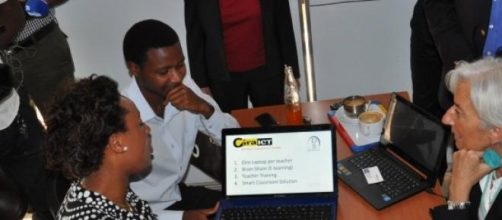Skilled people armed with a laptop connected to the Internet can now starttheir own companies or work as freelancers. Hence working remotely has become atrend that is expected to grow in the future as the number of virtualopportunities increase.
Personally, I have worked in coffeeshops, libraries and other places where I could find an internet connection. But Iwas missing a community where I could belong and connect with like minded youngpeople. My search for an office came to an end when I discovered kLab, aninnovation hub in Kigali that offers free office space and internet connectionto young entrepreneurs.
As you enter the hub, you see youngmen and women concentrated in front of their laptops. When you approach them,one gets amazed to hear their individual stories. A number of them have nownurtured their ideas into start-ups that provide efficient solutions to themarket. The hub's success stories have made headlines in the media and kLab has becomea popular destination among high profile visitors to Rwanda.
In a period of one month, kLabsuccessively hosted visitors such as Christine Lagarde, Managing director ofthe International Monetary Fund, Zhao Houlin the Secretary General of theInternational Telecommunication Union and Japan International CooperationAgency President Akihiko Tunaka.
These visitors had time to chatwith young entrepreneurs who have launched software companies.
The latter havecreated solutions for companies involved in distribution of goods, transport,and education among other sectors.
Christine Lagarde said thatinnovation technology projects like kLab are vital to Rwanda`s futuredevelopment. JICA`s president noted that innovation can take place when youngpeople are offered free and flexible workplaces to collaborate.
Zhao Houlin alsopraised kLab achievements for creating an innovative environment for young entrepreneursand boosting job creation.
The innovation lab is situated inthe same building as Carnegie Mellon University. Young entrepreneurs havetherefore taken advantage of its faculty members by involving them in the boardof their companies.
Rwanda envisions being a service-based economy and hasfollowed the suit of countries that are competing to become innovation hubs.
In order to spur the spirit ofinnovation, remote workers should, in my view, be supported by decision makers bycreating open spaces where they can test their ideas. Such an initiative canbolster collaboration and create employment. Nowadays, mindsets areshifting away from the primary view of an office, in a company building, to avirtual space that can be accessed from a laptop or Smartphone.
Technology has definitely led tocreative destruction in the workplace. This shift from a physical office to avirtual one was made possible by the availability of laptops, mobile devices, andhigh speed wireless networks among others.
These are tools young people arecomfortable with especially when they are given the right skills in schools.
Are decision-makers around the worldaware of this shift? The answer is yes but the problem is how they are adoptingthem to catch up with the rapidly changing workplace. Youth around the worldare confronted by high rates of unemployment. I think one way to tackle it isfor decision makers to invest in innovation hubs. At the end of the day, it lookslike they will characterize the future of workplace.

